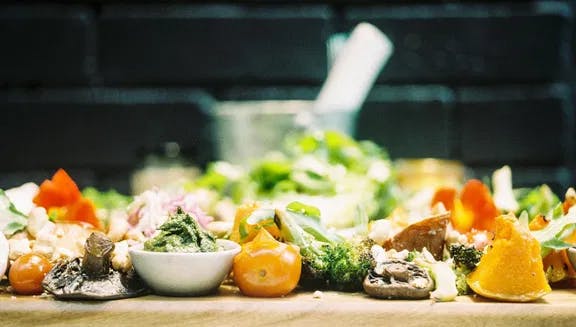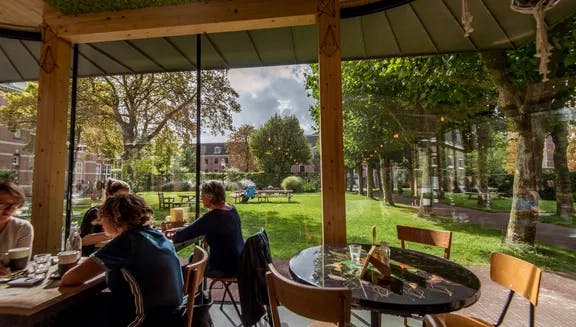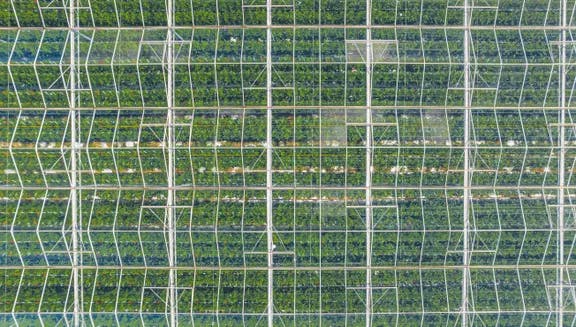
Feeding the future: Amsterdam's role in the global food transition
Amsterdam's agricultural innovation
The agrifood system in Amsterdam, which emerged in the 19th century with technological advancements like greenhouse cultivation and crop rotation, has played a vital role in guaranteeing widespread access to affordable and reliable food. However, it is no secret that the agrifood industries put a lot of pressure on the environment, impacting biodiversity and contributing to greenhouse gas (GHG) emissions. As a global agrifood hub, particularly in logistics and trade, Amsterdam recognises the need for innovative policies aligning with Sustainable Development Goals to benefit both the planet and its inhabitants.
City ambitions for a holistic food strategy
Today, Amsterdam's Food Strategy is committed to transforming the local food system with a focus on health, fairness, sustainability, and affordability. Through six action lines, including fair and affordable food, food waste, and urban agriculture, the strategy aims to contribute to a circular and ecologically responsible food system.
Key ambitions include encouraging predominantly plant-based food consumption, promoting short food chains, and minimising food waste. The city's plan aligns with a regional shift towards plant-based proteins, sourcing locally produced food, and reducing food waste by 50% by 2030.
Adopting a pioneering stance, the Dutch government has become the first EU country to authorise limited tastings for lab-grown meat and seafood. Notably, the Netherlands boasts the highest per capita consumption of plant-based foods, establishing itself as the sixth-largest plant-based market in Europe.
The Netherlands, known as the world's second-largest agricultural exporter, now leads in future-proof food solutions, including alternative protein development and precision farming. The Amsterdam Area actively attracts forward-thinking companies as a leading hub for these innovations, leveraging its strengths for sustainable progress.

Enhancing food security through research collaboration
In Amsterdam's food scene, innovation stems from research platforms, including the Ams Institute, specialised research departments, the Amsterdam Green Campus, Flevo Campus along with Brave New Food. These hubs facilitate collaboration between companies, government, and talent, driving transformative projects to enhance food systems. Initiatives focus on promoting healthy food environments, improving food accessibility, advancing protein transition, and raising awareness on climate adaptation and biodiversity. Additionally, they aim to educate on Amsterdam's food culture, fostering community connection and understanding.
Amsterdam’s research hubs join other leading institutions in the Netherlands, like Wageningen University & Research (WUR), a global agrifood leader, which collaborates in close partnership with the city of Amsterdam on research assignments, and education opportunities. Most recently, the Circular Urban Food Production to map how leftover foods could be used for nutrient or soil improvement.
Startups reshaping perspectives for both health and environmental benefits
Amsterdam's food sector is witnessing transformative trends, including a shift to alternative protein sources, digitalisation, and agritech innovations enhancing supply chain efficiency. Circular practices, such as urban and vertical farming, shorter supply chains, and improved waste processing, are gaining prominence.
- Green Food Lab - a certified B Corp, excels at connecting nutrition and sustainability, contributing actively to global transformation through its emphasis on social and environmental responsibility. Together, these entities drive impactful collaborations, pushing the boundaries of a more sustainable and innovative food ecosystem in Amsterdam.
- Crisp - shining examples of efficiency in supply chains and circular practices. The super-market app prides itself on making better food accessible using local, pure, and sustainable products, actively supporting local small-scale suppliers and produce growers.
- De Nieuwe Keuken - advocates for a shift from meat-centric meals to a more vegetable-centric diet. Rather than centring meals around meat, they emphasise the deserving role of vegetables. The team aims to reshape perspectives for both health and environmental benefits.
- Growy - a company specialising in vertical farming, combines extensive agricultural experience with the latest technology developments to provide on-demand produce of consistently high-quality fresh greens.
- The Waste Transformers - who turn waste into value, developed an on-site containerised anaerobic digester, to turn kitchen waste into biogas and heating.
The city is a hotbed of impact-driven companies like Crisp and De Nieuwe Keuken who are actively promoting the transition towards more sustainable and regional food systems.
Amsterdam's food sector is exemplary of a commitment to research, innovation, and sustainability, shaping the region’s role as a global leader in the ongoing food transition. Through collaborative efforts with food hubs, startups, institutions, and government-led initiatives, Amsterdam paves the way for a healthier, fairer, and more sustainable future in food.
Related articles

Meet the companies driving the protein transition in Amsterdam

Amsterdam becomes home to MotherDuck's European operations

Top tips from the Amsterdam companies leading the fight against food waste

Feeding the community: Amsterdam food companies driving social change

Why are the Dutch eating so many meat substitutes?

Vertical farming company Growy is on a mission to feed the world

Key facts and figures on Amsterdam’s food sector

Wasteless combats food waste with an AI-powered pricing model

Amsterdam’s top energy startups to watch in 2024

